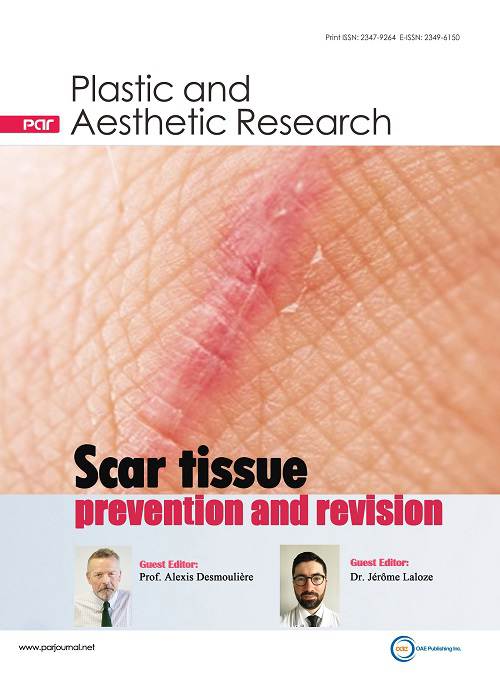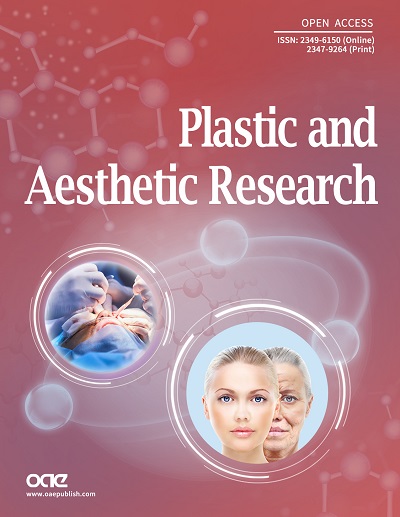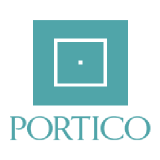
Topic: Scar Tissue Prevention and Revision
A Special Issue of Plastic and Aesthetic Research
ISSN 2349-6150 (Online) 2347-9264 (Print)
Submission deadline: 15 May 2020
Guest Editor(s)
Dr. Jérôme Laloze
Department of Maxillo-Facial and Reconstructive Surgery and Stomatology, Dupuytren University Hospital, Limoges, France.
Special Issue Introduction
In current medical practice, severe scarring disorders can affect the patient at a functional level, as well as aesthetically and psychosocially. Understanding the mechanisms involved in normal and pathological healing processes is thus fundamental for preventing the development of more deleterious situations. In parallel, knowing about all the possibilities that are actually offered to treat pathological scarring is a requirement for all clinicians. The goal of this Special Issue is to report the latest up-to-date information concerning scar formation and the treatment of pathological scars.
The final remodeling phase of the healing process includes maturation and scar formation. A reduction in extracellular matrix deposition is observed as is a considerable loss of various cell types, including myofibroblasts (the major cell type involved in granulation tissue formation), which occurs by apoptosis. Inappropriate delay of apoptosis, thus increasing survival of myofibroblasts, may be a factor underlying pathological states including excessive scarring.
Interestingly, it has been suggested that an excessively long inflammatory phase, the phase which normally develops immediately after the lesion, can favor the development of pathological scars. How can we avoid the appearance of these pathologies? Is manipulation of the early-stage wound the right strategy for scar prevention? Is the use of mesenchymal stem/stromal cells that show trophic and anti-inflammatory properties a good option?
What are the different approaches currently proposed for treating scarring pathologies? Are surgical intervention and radiotherapy, laser therapy, corticosteroids and 5-fluorouracil treatment, and cryotherapy, useful options?
The applications of skin substitutes, not forgetting application of silicone and mechanical manipulation of the scar, are also alternatives.
All of these aspects of pathological scarring will be discussed in this Special Issue.
The final remodeling phase of the healing process includes maturation and scar formation. A reduction in extracellular matrix deposition is observed as is a considerable loss of various cell types, including myofibroblasts (the major cell type involved in granulation tissue formation), which occurs by apoptosis. Inappropriate delay of apoptosis, thus increasing survival of myofibroblasts, may be a factor underlying pathological states including excessive scarring.
Interestingly, it has been suggested that an excessively long inflammatory phase, the phase which normally develops immediately after the lesion, can favor the development of pathological scars. How can we avoid the appearance of these pathologies? Is manipulation of the early-stage wound the right strategy for scar prevention? Is the use of mesenchymal stem/stromal cells that show trophic and anti-inflammatory properties a good option?
What are the different approaches currently proposed for treating scarring pathologies? Are surgical intervention and radiotherapy, laser therapy, corticosteroids and 5-fluorouracil treatment, and cryotherapy, useful options?
The applications of skin substitutes, not forgetting application of silicone and mechanical manipulation of the scar, are also alternatives.
All of these aspects of pathological scarring will be discussed in this Special Issue.
Keywords
Mesenchymal stem/stromal cells, adipose-derived cells, hypertrophic scar, keloid, inflammation, granulation tissue formation, compression, skin substitute, mechanical manipulation
Submission Deadline
15 May 2020
Submission Information
For Author Instructions, please refer to https://www.oaepublish.com/par/author_instructions
For Online Submission, please login at https://oaemesas.com/login?JournalId=par&SpecialIssueId=330
Submission Deadline: 15 May 2020
Contacts: Smart Zhang, Managing Editor, editor002@parjournal.net









